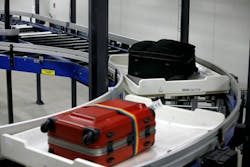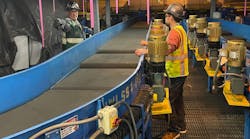BEUMER Group, a leading global supplier of automated material handling systems, has completed ahead of schedule a major upgrade to the baggage handling system at Singapore Changi Airport’s (SIN) Terminal 2. The early completion is particularly impressive given the challenges caused by the COVID-19 pandemic during this four-year project.
The enhancements to Terminal 2’s baggage handling system are part of the terminal’s expansion project, which began in 2020 with the aim of increasing handling capacity, enhancing facilities and deploying more efficient systems in response to growing passenger numbers. As air travel is predicted to exceed pre-pandemic levels in 2024, the re-opening of Terminal 2 in November 2023 was particularly timely. The expansion project has added 5 million passengers per annum (mppa) to Changi’s capacity, bringing the airport’s total handling capacity to 90 mppa.
Dynamic Handling
The refurbishment of the terminal’s existing tilt-tray sorter-based baggage handling system (BHS) has been central to making the terminal fit for the future. BEUMER Group has modernised the system mechanically and upgraded the control software to deliver higher reliability and efficiency. In addition, BEUMER Group has undertaken renewal of associated equipment comprising conveyors, carousels, early bag storage (EBS) system, and control system hardware and software; as well as interfacing with a new FAST self-service check-in system provided by the airport. The new control system also features advanced digital applications, particularly those linked to smart sensors and data analytics, that will help boost baggage handling process optimisation. The upgrade will extend the BHS system life span by 15-20 years.
The new BHS incorporates a brand new CrisStore rack-based storage system to improve baggage handling capacity, accuracy and security. This serves as a dynamic EBS system in which loading lanes replace the need for multiple make-up positions. The Terminal 2 EBS at Changi Airport now has storage capacity for 2,400 bags and includes 1,200 m of CrisBag, BEUMER Group’s individual carrier system for baggage conveyance. This technology is already familiar to Changi Airport, which uses CrisBag systems in Terminals 3 and 4.
Perfect Delivery
Upgrading the BHS in a live, operating airport required a high degree of detailed planning and risk management from BEUMER Group to minimise inconvenience and disruption to passengers and airlines. As the incumbent supplier and maintenance contractor for the T2 BHS, BEUMER Group collaborated closely with the appointed contractors and all other stakeholders to ensure smooth, safe and timely execution. The works were carried out in phases and mostly during off-peak periods to support the airport’s aim of reducing the impact on operations as much as possible. As a result of excellence in project management skills, BEUMER Group was able to complete the project earlier than anticipated.
Even COVID-19 was not allowed to prevent timely delivery of the Changi T2 project. As a long-term partner at the airport, BEUMER Group typically has more than 80 technicians on site. They worked with Changi Airport Group (CAG) to retain this workforce through retraining and redeployment during the pandemic, ensuring that the technical knowledge inherent in the maintenance team was preserved and available immediately when the airport was able to function again.
“The unprecedented COVID-19 pandemic had resulted in a severe labour crunch in Singapore, which initially impacted the progress of the T2 BHS redevelopment project,” said Hwee Onn Teng, group senior vice president (engineering management and systems planning) at CAG. “As Terminal 2 was subsequently closed due to the pandemic, CAG collaborated with BEUMER Group to absorb Terminal 2’s maintenance team into the T2 BHS redevelopment project. This not only helped to preserve the jobs of the maintenance team and enabled Changi Airport to bounce back strongly once travel restrictions were eased, it also alleviated the manpower shortage situation faced by the project team. This would not have been possible without the strong support and collaborative spirit of BEUMER Group’s management team.”
“For me, the Changi Terminal 2 project has been a benchmark example of how true partnership working can lead to great success. From the outset, our teams of experts have been working together to come up with the best solution for Changi from a planning, execution and technology perspective. Despite the major interference caused by the COVID-19 pandemic, we have been able to complete the project ahead of time and to the satisfaction of our valued customer, which has been our ultimate goal. Without a true partnership approach, this would not have been possible,” added Ronald Willems, airport divisional director, BEUMER Group.
The early handover of the new baggage handling system is the latest milestone in a long partnership between BEUMER Group and CAG. The two companies have worked together since 1998. Today, BEUMER Group undertakes year-round operational and maintenance support of the BHS as part of the overall care package for Changi Airport’s Terminals 2, 3 and 4. Their on-site team provides round-the-clock service to ensure that these mission-critical airport systems operate reliably and at optimum efficiency. BEUMER Group’s innovative use of technology and automation means that the number of personnel required to operate and maintain the BHS has not increased, despite the dramatic rise in passenger capacity.






